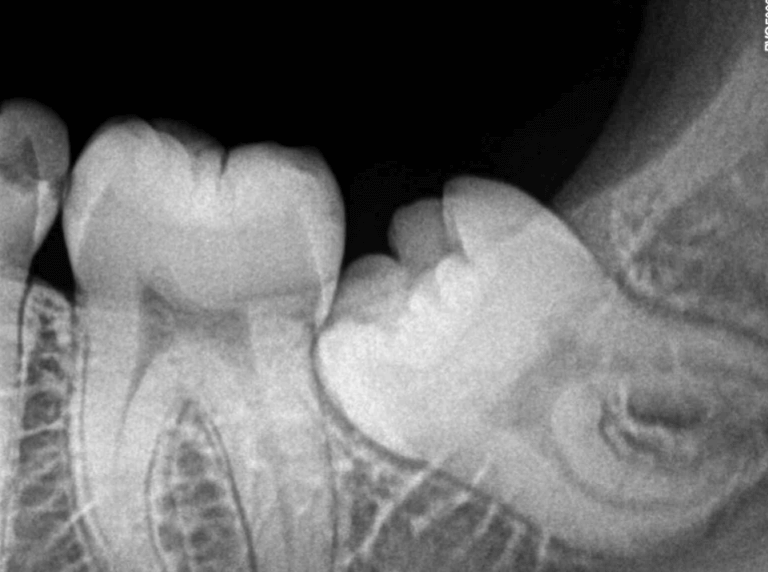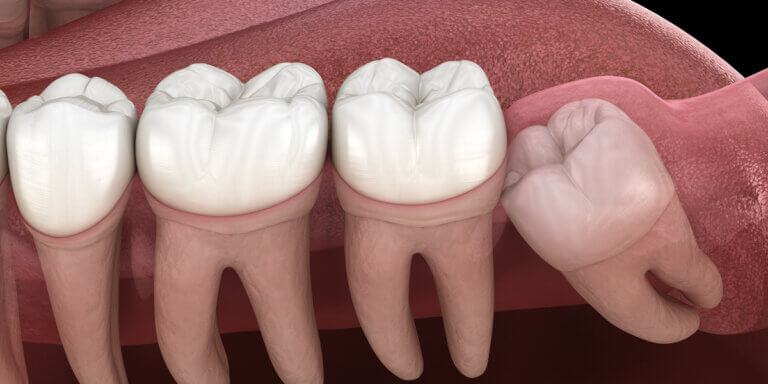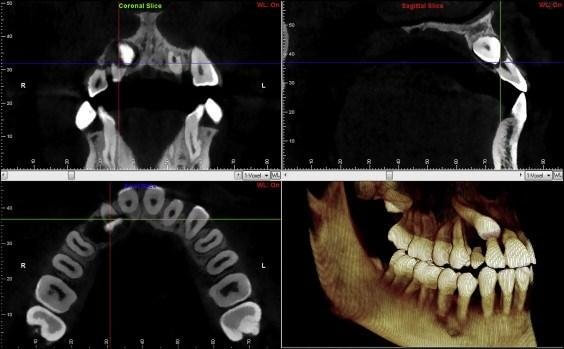CBCT Scan For Impacted Tooth

In the world of dentistry, Cone Beam Computed Tomography (CBCT) has emerged as a groundbreaking technology, offering unprecedented insights into the assessment and management of impacted teeth. This advanced imaging technique provides three-dimensional, high-resolution images, allowing dental professionals to navigate the complexities of impacted teeth with unparalleled accuracy. Before you deciding on whether a CBCT Scan for Impacted Tooth is right for you, there are some things you should know:
Table of Contents
If you have any further questions about CBCT Scans at Oral Radiology Toronto, please contact us.
What Are CBCT Scans?
Cone Beam Computed Tomography (CBCT) is a revolutionary x-ray imaging technology, providing three-dimensional views of the patient’s dental anatomy, including teeth, bones, nerves, and surrounding tissues. Unlike traditional two-dimensional X-rays, CBCT captures high-resolution, cross-sectional images by utilizing a cone-shaped beam of ionizing radiation. The enhanced precision and depth of information obtained through CBCT contribute significantly to the accurate diagnosis and treatment planning for a variety of dental conditions, including the evaluation of impacted teeth.
What Is An Impacted Tooth?
An impacted tooth refers to a condition where a tooth fails to fully emerge or erupt through the gum and into its normal functional position within the dental arch. This phenomenon most commonly occurs with third molars, also known as wisdom teeth, but can affect any tooth in the mouth. The impediment to proper eruption may arise due to various factors such as insufficient space, abnormal tooth positioning, or an obstruction in the tooth’s pathway. As a result, impacted teeth can lead to a myriad of issues, including pain, swelling, and potential damage to adjacent teeth. Understanding the nature and extent of impaction is crucial for developing an effective treatment plan. In this context, CBCT scans play a pivotal role, offering a comprehensive visualization of the impacted tooth’s position, orientation, and its relationship with surrounding structures. The detailed information obtained from CBCT scans is instrumental in guiding dental professionals toward precise and tailored interventions to address the challenges posed by impacted teeth.

Why Do I Need A CBCT Scan For An Impacted Tooth?
The necessity of a Cone Beam Computed Tomography (CBCT) scan for assessing impacted teeth lies in its unparalleled ability to provide comprehensive and detailed information. When dealing with impacted teeth, traditional two-dimensional imaging techniques may fall short in offering a complete understanding of the complex anatomical structures involved. CBCT scans, on the other hand, excel in delivering a three-dimensional view, allowing dental professionals to assess the impacted tooth’s position, orientation, and proximity to adjacent structures with exceptional precision.
The effects of an impacted tooth can vary depending on the tooth’s location, degree of impaction, and individual factors. Here are some common effects associated with impacted teeth:
- Pain and Discomfort: Impacted teeth often cause localized pain and discomfort. This can result from pressure on surrounding tissues, inflammation, or infection.
- Swelling and Redness: Impacted teeth can lead to swelling and redness in the gum tissue around the affected area. This is often a sign of inflammation or infection.
- Difficulty Chewing: Impacted teeth can interfere with the normal alignment of teeth, making it difficult to chew properly. This can lead to discomfort and may affect overall oral health.
- Bad Breath: When an impacted tooth causes inflammation or infection, it may contribute to bad breath (halitosis).
- Cysts or Abscesses: Impacted teeth can sometimes lead to the formation of cysts or abscesses around the impacted tooth. These can cause more severe pain and may require surgical intervention.
- Shifting of Adjacent Teeth: Impacted teeth can put pressure on adjacent teeth, causing them to shift position. This can lead to misalignment and affect the overall alignment of the dental arch.
- Damage to Surrounding Teeth: The pressure exerted by an impacted tooth can lead to damage to neighboring teeth, including root resorption or increased risk of decay.
- Sinus Issues: In the case of upper wisdom teeth impaction, there may be a risk of sinus-related issues, such as sinus pain or congestion.
- TMJ (Temporomandibular Joint) Issues: Impacted teeth, especially in the lower jaw, may contribute to temporomandibular joint issues, leading to jaw pain and dysfunction.
It’s important to note that not all impacted teeth cause noticeable symptoms, and some may be detected only through routine dental X-rays or more advanced CBCT imaging. CBCT scans provide a three-dimensional view, allowing dental professionals to assess the impacted tooth’s position, orientation, and proximity to adjacent structures with exceptional precision.

How Much Does A CBCT Scan Cost For Impacted Tooth?
At Oral Radiology Toronto, we provide quick and convenient dental CBCT scans for busy dentists and patients in the Toronto area. Our CBCT scans are useful for assessing the teeth, their supporting structures, the mandible and maxilla up to the floor of the nose.
Our competitively priced dental CBCT scans are professionally reviewed and interpreted by a Canadian licensed Oral Radiologist.
Prices are based on the size of CBCT volume:
- Small Field CBCT (most dental cases; 5x5cm): $234
- Medium Field CBCT : $315.90
- Large Field CBCT (8x8cm): $399
- Panoramic X-Ray: $84
Normal CBCT report turnaround time is up to 10 business days. Expedited reporting (2 business days) is an extra $50.
Please note that we do NOT offer field of views larger than 8x8cm or imaging of structures outside the maxilla and mandible, such as the temporomandibular joints, paranasal sinuses, the cervical spine, the neck and the airway spaces (i.e. craniofacial CT scan).
How Do I Get A CBCT Scan For Impacted Tooth?
- For Referring Dentists: Refer a dental patient for a CBCT Scan using our Online Referral Form.
- For Dental Patients: Schedule a CBCT scan visit at Oral Radiology Toronto using our Online Appointment Booking System.
